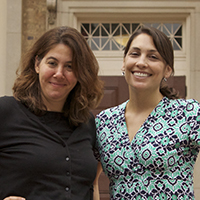
UNC-Chapel Hill is one of 24 universities nationwide to receive funding from the U.S. Department of Education through its new First in the World grant competition, designed to spur innovation in higher education and help more students complete their college education.
Carolina’s Office of Undergraduate Education in the College of Arts and Sciences will receive $3 million over four years to fund The Finish Line Project, a program for first-generation college students — as well as rural, transfer and historically underserved students — that includes curricular innovations, outreach and support, and pathways for timely and affordable degree completion.
The Finish Line Project is based on dissertation work by Cynthia Demetriou, who completed her doctorate in educational psychology, measurement and evaluation in August. Demetriou will serve as executive director of the project.
Campus partners include the School of Education, the Center for Faculty Excellence and the American Indian Center. Judith Meece, professor of educational psychology and Demetriou’s doctoral adviser, will serve as lead researcher for developing outreach and support programs focused on UNC-CH students matriculating from rural high schools.
The most effective retention and degree completion programs require many different approaches and campus-wide interventions, said Abigail Panter, senior associate dean for undergraduate education in the College and a professor of psychology, and the grant’s principal investigator. “Fortunately, we are at an ideal time at our University with multiple ongoing efforts to redesign key introductory (“gateway”) courses, improve access to high-impact academic experiences and provide proactive, intensive academic support to our students.”
At Carolina, about 20 percent of the undergraduate population, or a little more than 3,000 students, are first-generation college students. Demetriou, director of undergraduate retention in the College, finds that first-generation college students are twice as likely as non-first-generation students to leave college before the start of the second year. Barriers include insufficient academic preparation, the need to work to pay for education, cultural differences and lack of family support.
Students transferring from community colleges and majoring in STEM (science, technology, engineering and mathematics) fields are at particular risk of not finishing their education. “While nearly half of new transfers to Carolina express interest in majoring in STEM fields when they arrive, only a much smaller fraction actually manage to do so,” said Demetriou. “Our grant will help us address specific aspects of STEM training that can derail students.”
Panter and Demetriou advocate for evidence-based approaches that help to narrow the gap between first-generation students and students who may arrive on campus better prepared to navigate the academic rigor of a national research university.
“The Finish Line Project builds on a foundation of effective programs and practices that have already been piloted at Carolina,” said Chancellor Carol L. Folt. “With this grant, Dr. Panter and Dr. Demetriou will be able to combine curricular innovations, such as redesigned STEM classes that engage students through an active learning environment, and special transition courses that help students understand academic expectations. I am confident that the Finish Line Project will boost retention and graduation rates at UNC and will be a model for other programs nationwide.”
Carolina has a four-year graduation rate of 81.8 percent and a six-year graduation rate of 90 percent — among the highest in the country for major public universities. Yet graduation rates for first-generation college students are much lower.
“As dean, one of my most important strategic priorities has been to develop programs that help all of our students navigate the path to graduation,” said Karen Gil, dean of the College of Arts and Sciences. “The Finish Line Project will do just that.”
The Finish Line Project builds on a foundation of effective programs and practices that have already been piloted at Carolina. These include curricular innovations such as redesigned STEM classes that engage students through an active learning environment and special transition courses such as “Navigating the Research University” that help students understand academic expectations.
Other resources included in the grant are curriculum mapping of community college STEM courses with UNC science courses; proactive, intensive academic advising starting before enrollment and continuing throughout a student’s time at the University; individual and group tutoring; creating faculty learning communities to encourage experimentation and collaboration; student success seminars; and professional development opportunities.
The Finish Line Project also includes resources to study rural students, who face unique challenges in adjusting to college life but who have not been well studied. Eighty of North Carolina’s 100 counties are considered rural.
More than 500 colleges and universities applied for a federal First in the World grant. The 24 institutions selected were from 17 states and include public and private universities and two-year institutions. Grants ranged in size from $1.6 million to $4 million.
“Each grantee demonstrated a high-quality, creative and sound approach to expand college access and improve student outcomes,” U.S. Secretary of Education Arne Duncan said Tuesday of the institutions selected to receive a total of $75 million in funding. “We are confident these projects will have a positive impact on increasing access and completion and help us reach President Obama’s 2020 goal, to once again have the highest share of college graduates in the world.”